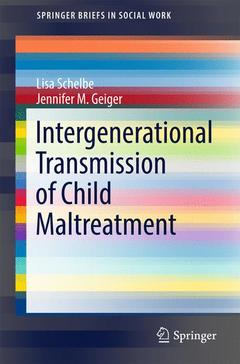Description
Intergenerational Transmission of Child Maltreatment, 1st ed. 2017
SpringerBriefs in Social Work Series
Language: English
Subjects for Intergenerational Transmission of Child Maltreatment:
Publication date: 11-2016
Support: Print on demand
Support: Print on demand
Description
/li>Contents
/li>Biography
/li>Comment
/li>
This accessible resource coordinates what we know about the intergenerational transmission of child maltreatment (ITCM), with a specific focus on prevention in context. Cutting through facile cause-and-effect constructs, the authors review and critique the recent literature on the complicated nature of the phenomenon and weigh different approaches to its conceptualization. The book identifies child and parental risk factors linked to ITCM as well as protective factors involved in its reduction, while examining complex relationships between family, parenting, and social contexts that can provide keys to understanding and healing traumatized families. This close attention to crucial yet often overlooked details will aid professionals in creating the next wave of salient research projects and effective interventions, and enhance current efforts to break longstanding patterns of abuse and neglect.
Among the topics covered:
? Theoretical frameworks conceptualizing intergenerational transmission of child maltreatment.
? Empirical studies on intergenerational transmission of child maltreatment.
? Risk factors associated with ITCM.
? Protective factors associated with breaking the cycle of maltreatment.
? Methodological challenges in studying ITCM.
? Recommendations for evaluation of intervention and prevention strategies.
Geared toward novices and veterans alike, Intergenerational Transmission of Child Maltreatment is a solution-focused reference of singular importance to practitioners and research professionals involved in improving children?s well-being.
What is Intergenerational Transmission of Child Maltreatment?.- Theoretical Frameworks Conceptualizing Intergenerational Transmission of Child Maltreatment.- Summary of Research on Intergenerational Transmission of Child Maltreatment.- Risk Factors Associated with Intergenerational Child Maltreatment.- Interrupting Intergenerational Transmission of Child Maltreatment: Protective Factors Associated with Breaking the Cycle of Maltreatment.- Future Research on Intergenerational Transmission of Child Maltreatment: Methods, Constructs, and Contexts.- Interventions and Prevention Strategies to Address Intergenerational Transmission of Child Maltreatment.
Lisa Schelbe, PhD, MSW, is an Assistant Professor at Florida State University College of Social Work. She earned her doctorate from the University of Pittsburgh School of Social Work where she was a recipient of the Doris Duke Fellowship for the Promotion of Child Well-Being. Her research primarily focuses on the experiences of youth aging out of the child welfare system. She is interested in the prevention of child maltreatment and promotion of child well-being.
Jennifer Mullins Geiger, PhD, MSW is a Postdoctoral Fellow at Arizona State University School of Social Work. She earned her doctorate from Arizona State University in 2014. She received a Doris Duke Fellowship for the Promotion of Child Well-Being in 2011. Jennifer’s research interests include child maltreatment prevention, youth aging out of the child welfare system, pregnancy and parenting among youth who are aging out of foster care, and empathy.
Presents theoretical frameworks that are useful in understanding ITCM
Critiques the current ITCM literature
Examines specific populations that have been identified to be affected by ITCM
Offers directions for future research and interventions
Includes supplementary material: sn.pub/extras
© 2024 LAVOISIER S.A.S.




